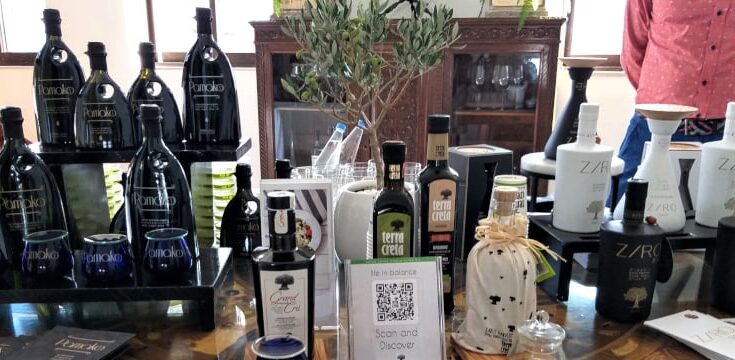In certain upscale restaurants in Greece (some in five-star hotels), extra virgin olive oil is now being elevated to the level of fine wine.
By Lisa Radinovsky
So at the 2nd International ELIA Lesvos Confest in Greece, chefs discussed recent trends in the use and presentation of olive oil in gastronomy, such as olive oil menus, olive oil bars, and even olive oil sommeliers.
In selected restaurants, diners will now find an extra virgin olive oil (EVOO) menu describing each olive variety and place of origin, as well as noteworthy production techniques and distinctive flavors and aromas.
The restaurant’s main menu may include information about the specific olive oils used in each dish. Some restaurants and hotels now offer guided olive oil tastings and seminars led by experts who oversee olive oil bars that feature a carefully curated selection of high quality EVOOs.

Olive oil bar in Greek restaurants
Judged the “Best Olive Oil Chef” in the world for 2017 by Flos Olei, the international olive oil guide from Italy, Executive Olive Oil Chef Vasilis Leonidou considers the olive oil bar “a gastronomy trend that must stay.”
In Greece, the first olive oil bar opened in Athens approximately 15 years ago. Olive oil bars supervised by Leonidou have included from 6 to 70 oils from all over Greece and the world. While most olive oil bars feature fewer EVOOs, for him even 70 “was not an excessive number” since it provided an excellent opportunity to make comparisons among oils.
At Avli Restaurant in Rethymno, Crete, where Leonidou is employed, the oils are “not only there to be tasted, but also to be used on the table and in some of the foods that we offer our visitors.”
The restaurant’s menu refers to the specific EVOO used in each dish. “We mention the producer, the family, the variety, whatever should be known,” Leonidou explains. “We make a presentation like wine, what it is, where it comes from.” Many visitors are surprised but also impressed.
Things have changed in the last decade. Initially, it was hard to convince Greek customers that olive oil should be poured onto their dessert, but now they recommend it to their friends. Leonidou reports that “wine companies are getting interested in olive oil.”
He remembers that ten years ago “when you were talking about EVOO, samples you tasted, they looked at you as if you were an alien, an astronaut that traveled to the moon.” Later, the challenge was to teach people what a good extra virgin olive oil was, and to convince them it was worth paying for.
“No one ever accused us of using too much olive oil”
That is not currently an issue for Ioannis Tsivourakis, Corporate Executive Chef at Minoa Palace and Euphoria Resorts in Crete, who discussed olive oil use in 5-star hotels.
Responding to a question about managers’ willingness to spend money on high quality extra virgin olive oil, Tsivourakis admitted that “cost is very important for hotels,” but added that in Crete “our culture is deeply rooted in the local tradition. We were never accused of using too much olive oil. No one thought of reducing consumption.”
He and the management share the same culture and belief in the value of the Greek Mediterranean diet, and two of their restaurants are certified for serving traditional Cretan cuisine.
At Minoa Palace and Euphoria Resorts, extra virgin olive oil is used in many ways: to cook, fry, bake, eat raw in salads and sauces, and finish dishes with a drizzle.
“Olive oil gives dishes a character, a special aroma,” Tsivourakis emphasized. While some are surprised that they even fry with olive oil, he pointed out that beneficial substances in olive oil are absorbed by the food, increasing its nutritional value.
“Olive oil may be slightly more expensive, but there’s no doubt it is best for cooking, frying, and pairing with our dishes. It helps us give extra value to the gastronomy that represents our country.”
To be sure guests understand this, Tsivourakis and his team offer a buffet of premium olive oils that are free for customers to use. They arrange olive oil tastings with customers, offer specific olive oil-food pairings on the restaurant menu, and provide cooking lessons with an emphasis on olive oil and traditional local gastronomy.
Even on one of the most popular Greek islands, Santorini, where olive oil is not produced, visitors can now discover the secrets of this key component of Greek cuisine thanks to Fanis Maikantis and his team.
Maikantis is Executive Chef and Panigyri Restaurant Owner and co-founder of Olive Oil Experience, which educates visitors in tastings, seminars, and food pairings at the restaurant. They use 7 or 8 olive oils for their experiences and 25 to 30 EVOOs in their dishes. The restaurant’s olive oil sommelier presents specific oils to pair with certain dishes and explains to guests why they go well together, in addition to providing information about the EVOO’s origin.
“We may try to save on other things, but we should never make any compromises when it comes to extra virgin olive oil for our precious dishes,” Maikantis insists. “Olive oil is really the magic ingredient. It can create a spectacular dish or really destroy it.”
To fully appreciate this, visitors need to be trained to taste and recognize excellent EVOO. He and his team are helping “foreign visitors become ambassadors” for excellent Greek extra virgin olive oil.
As increasing numbers of restaurants and hotels prioritize the use and presentation of exceptional Greek extra virgin olive oils, more tourists can become ambassadors in their home countries for one of the most important traditional products in the famously healthy Greek Mediterranean diet.
Originally published on Greek Liquid Gold: Authentic Extra Virgin Olive Oil (greekliquidgold.com). See that site for recipes with olive oil, photos from Greece, agrotourism and food tourism suggestions, and olive oil news and information.



